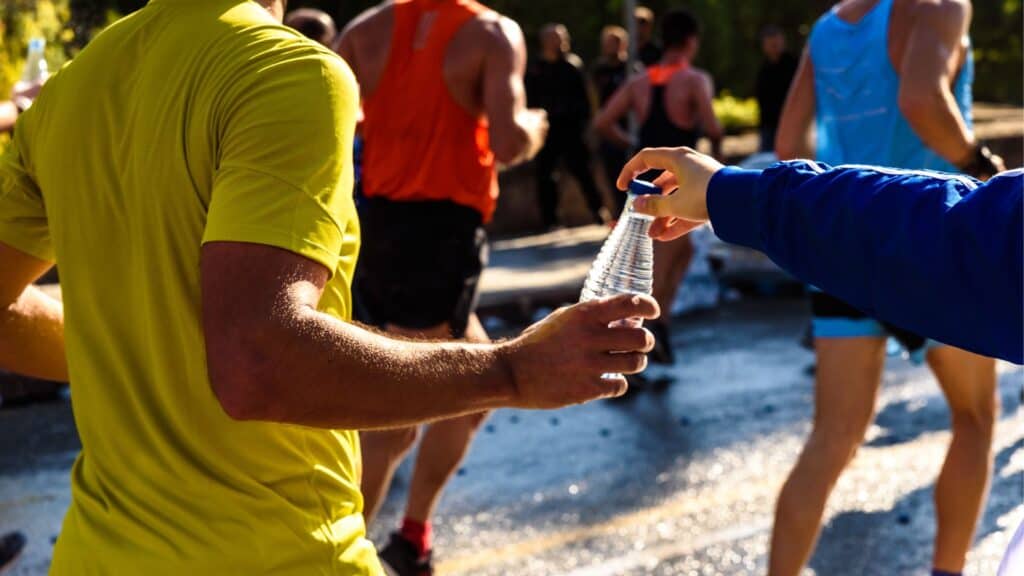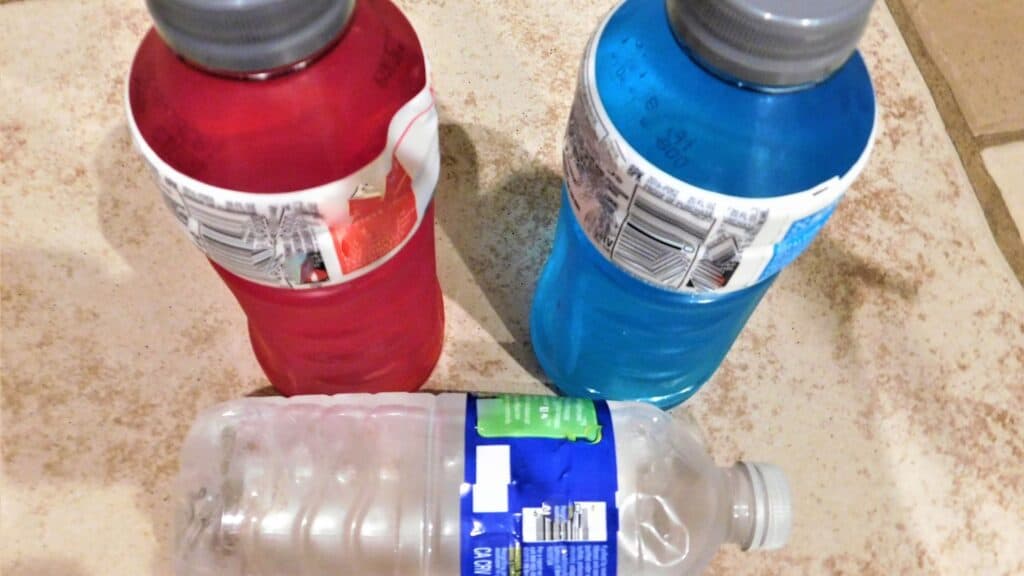As a marathon runner, you are likely aware of how crucial nutrition is when it comes to optimizing your performance.
Whether you are a seasoned pro or a first-time participant, it is essential to understand what types of foods and drinks are available to you at the Tokyo Marathon. The right nutrition can make all the difference when it comes to crossing the finish line with success.
In this blog, we will look at what awaits you in Tokyo at the stations and how you can make the best choices for your peak performance on race day.

Can I Carry My Own Hydration Pack At The Tokyo Marathon
If you choose to bring a hydration pack or handheld with you to the event, it’s important to note that you can’t pass through security with it already filled with water.
However, you can carry it empty and then fill it up once you’ve passed through the security lines.
What Nutrition Is At The Tokyo Marathon
Given that you won’t be able to bring your own fuel to the race, it’s important to rely on what’s provided along the course for your nutritional needs.
Pocari Sweat is the official electrolyte supplier along the course and before/after the marathon. This beverage offers a mild grapefruit flavour and is known for its balanced sweetness, devoid of any lingering aftertaste.
What makes Pocari Sweat special is that it contains carbohydrates, primarily glucose and fructose, which provide a quick energy boost during your marathon.
Designed to be an isotonic solution, Pocari Sweat closely matches the concentration of salts and sugars found in the human body. This design facilitates rapid absorption and minimizes the risk of stomach discomfort during exercise.
Now, the name “Pocari Sweat” might sound peculiar to English speakers, but it’s essentially a branding choice and doesn’t mean the drink contains actual sweat.
You can source it during your training by ordering from Amazon or purchasing it at your local H-Mart.
Along the course, you may come across tables stocked with items like bread rolls (sometimes filled with chocolate or dried fruit), bananas, and even unexpected options like cherry tomatoes.

Will There Be Sushi On The Run?
It’s unlikely that there will be sushi provided during the Tokyo Marathon. Sushi is not a practical food to distribute during a marathon due to its perishable nature and the need for specialized preparation.
If you’re interested in enjoying sushi while in Japan, you might want to visit a local sushi restaurant or try the diverse street food options available throughout the city, but it wouldn’t be something provided during the actual race.
Stop only for drinks and fuel, as you have planned in your training. NO TRYING NEW THINGS ON RACE DAY!
Now that you’re aware of the available nutrition options along the course, let’s discuss the ideal nutrition strategy for the Tokyo Marathon…
What To Eat While Running The Tokyo Marathon
When it comes to what to eat while running the Tokyo Marathon, here are some crucial tips to keep in mind for a successful race day:
1. Experiment with Different Nutrition Options: During your training, experiment with different nutrition options to discover what suits your body best in terms of fuel and energy.
2. Stick to a Familiar Breakfast: On the morning of the race, stick to a breakfast that you are familiar with. Avoid trying new foods that might not agree with your stomach on race day.
3. Familiarize Yourself with Aid Stations: Get to know the offerings at aid stations along the course so you can plan your refueling strategy accordingly.
4. Prioritize Hydration and Carbohydrates: Throughout the race, prioritize both hydration and carbohydrate intake to maintain your energy levels and keep hydrated.
To achieve the best success on race day, practice your nutrition and hydration strategies during your training.
You want to make sure that your body is used to the hydration and fuel you plan to consume on race day.
This helps you avoid any surprises or issues with digestion or energy levels during the marathon.
Additionally, make sure to plan and prepare your race-day nutrition the night before the event for peak performance.
The Week Before:
In the week leading up to the marathon, focus on the following:
- Maintain good hydration
- Consume sufficient carbohydrates.
- Reduce fiber intake for 2-3 days before the race to avoid gastrointestinal issues.
The Night Before:
On the evening before the Tokyo Marathon, prepare the following nutrition checklist:
- Have breakfast prepared and ready to eat about two hours before the race.
- If using a hydration pack (maximum 3 liters), fill it up.
- Carry a snack and a water bottle for a pre-race energy boost.
- Lay out your race nutrition items like gels, bars, rehydrate, sports drinks, etc.
- Stay well-hydrated but avoid alcohol consumption.
The Day After:
Post-race recovery is a critical aspect of marathon training. Once you’ve completed your marathon, it’s essential to support your body’s recovery process.
Here are a few key points to consider:
Replenishing Carbohydrates
After the marathon, your glycogen stores are likely depleted. Replenishing these stores by consuming carbohydrates is essential for recovery. You will get a bottle of Pocari Sweat in the finish area.
Incorporating Protein
Including some protein in your post-race meal can help with muscle repair and recovery. Lean protein sources like chicken, fish, or plant-based options such as tofu or beans can be beneficial.
Hydration
Marathon running can lead to dehydration, so rehydrate with water or electrolyte-rich beverages. Be mindful of your fluid intake, as it’s crucial to replace lost fluids. You’ll receive a bag with a bottle of water once you cross the finish line.
Stretching and Cool-Down
After the race, don’t forget to stretch and cool down. Gentle stretching can help reduce muscle soreness and improve flexibility.
Rest and Sleep
Your body needs time to recover, so ensure you get adequate rest and sleep in the days following the marathon. This is when your muscles repair and rebuild.
Alcohol Consumption
While a moderate amount of alcohol may not be detrimental, excessive alcohol consumption can lead to dehydration. It’s essential to balance your recovery goals and hydration needs.
Nutrient Timing
Nutrient timing is essential. Try to consume a well-balanced post-race meal within a few hours of finishing the marathon to kickstart recovery.
Remember that recovery is a personal process, and it may take a few days for your body to fully bounce back.
Be patient with yourself and listen to your body’s cues for rest and nourishment.
Let’s take a closer look at breakfast before the Tokyo Marathon.

Breakfast Before the Tokyo Marathon (About 2 Hours Before)
Having breakfast about two hours before the marathon is crucial for your performance.
This meal helps preserve your glycogen stores, which are your body’s primary energy source for endurance activities like running.
While it may not completely prevent you from hitting the dreaded “wall,” it can delay its onset.
To make the most of your pre-marathon breakfast, choose foods that are low in fat and fibre. These can sometimes cause digestive issues during the race.
Stick to foods you’ve eaten before and practised during your training to avoid any unpleasant surprises on race day.
Here are some examples of suitable breakfast options before running a marathon:
- Pancakes with fruit
- Banana bread
- Granola with milk
- Sweetcorn fritters
- Oats
- Toast with peanut butter
Just Before the Race Starts (About 45 Minutes Before):
As the start time of the race approaches, it’s common to feel a mix of excitement and a touch of anxiety. You may also need to wait for a while before your corral is called to the starting line.
To keep your energy levels up during this time, it’s a good idea to have some snacks with you. This will help you stay fueled and ready to tackle the marathon ahead.
Remember to choose easily digestible snacks like energy gels, chews, or small portions of energy bars, and sip water from your bottle to stay hydrated.
Proper pre-race nutrition can make a significant difference in your performance on race day.
8 Nutrition Tips for Peak Running Performance At the Tokyo Marathon
Refuel With A Little Extra
Consider having a slightly larger dinner the night before a challenging morning training session. This extra fuel can make a difference in your performance, especially for those intense workouts.
While it’s important to watch your carbohydrate intake, don’t be afraid to provide your body with a little extra fuel to support your training.
Don’t Skip Main Meals
Proper nutrition plays a vital role in your performance.
Carbohydrates are your primary fuel source but don’t forget the importance of protein in your main meals.
Proteins help in recovery and support your overall health, including bone health.
Here’s a balanced approach to structuring your meals:
Half of Your Plate: Fill it with vegetables or fruits, aiming for a variety of colorful, nutrient-rich options.
A Quarter of Your Plate: This section should include a starchy source, preferably whole grains. Whole grains provide sustained energy for your runs.
Another Quarter of Your Plate: Include a lean protein source to support muscle recovery and your overall health.
Strive to create these balanced meals throughout the day, and complement them with smaller protein-rich snacks in between.
Focus on real, unprocessed foods, and choose high-quality carbohydrate sources like whole grains, fruits, and vegetables while avoiding heavily refined items such as potato chips, refined biscuits, and processed bars.
Fuel Up During Training
Fueling during your training sessions is crucial. It supports your immediate performance and helps train your gut to handle extra fuel effectively on race day.
Think of your body’s glycogen stores as the fuel tank of a car. Depending on the intensity of your training session, you typically have about 60 to 90 minutes worth of glycogen stored in your tank.
If you deplete these stores during training and don’t regularly replenish them, you risk running out of fuel during your workout.
Additionally, refilling the glycogen tank isn’t instant; it can take up to 72 hours to fully restore glycogen stores, especially after intense workouts.
This is why you might feel fatigued for a day or two after a particularly strenuous run or race. So, it’s essential to keep your tank well-fueled to perform your best.
This Is How Long You Should Wait After Eating To Go For A Run
Support Muscle Recovery
After your training session, it’s very important to consume a combination of carbohydrates and protein as soon as possible.
This post-workout nutrition is essential for muscle recovery, restoring depleted glycogen levels, and repairing your muscles.
The first four hours after strenuous exercise are particularly important for replenishing glycogen stores that were used up during your training session.
Consuming carbohydrates during this period helps replace the lost glycogen and supports your body’s recovery process.
In addition to carbohydrates and protein, runners, like anyone else, require essential vitamins, minerals, and nutrients like iron, vitamin D, calcium, and magnesium.
Eating a variety of colorful and nutrient-rich vegetables is an excellent way to obtain these essential nutrients.
Eat a Colorful Diet
Vitamin C is a crucial nutrient with multiple essential functions in the body.
One of its primary roles is to facilitate the synthesis of collagen, which is vital for maintaining the integrity of various body structures, including bones, muscles, skin, and tendons.
Additionally, vitamin C plays a significant role in the body’s natural recovery processes, particularly in wound healing.
To ensure you receive an ample supply of vitamin C and other essential nutrients, make an effort to incorporate a wide variety of colorful fruits and vegetables into your diet.
Consuming a diverse range of colorful foods is not only beneficial for your overall health but can also help you save money by reducing the need for expensive supplements.
Adjust for Training Intensity
As a runner, you’ll engage in a variety of training sessions, each with its own unique characteristics and demands.
Whether it’s a lengthy 3-hour long run, a high-intensity 45-minute interval workout, or a shorter 45-minute recovery run, it’s evident that these workouts come with distinct nutritional requirements.
To optimize your performance and provide your body with the necessary support during training, it’s crucial to tailor your nutritional intake to match the specific characteristics of each training session and its level of activity.
Different workouts place varying demands on your energy stores, muscle recovery, and overall nutrient needs.
For more extended and more intense sessions, like a 3-hour long run or an interval workout, you may require more carbohydrates to fuel your endurance and replenish glycogen stores.
On the other hand, shorter and less demanding sessions, such as recovery runs, may necessitate lighter nutritional support.
It’s all about finding the right balance to meet the unique needs of each training session.
Stay Hydrated
Maintain proper hydration year-round, as water is essential for transporting nutrients, eliminating waste, and regulating body temperature.
Find the right balance to avoid both dehydration and overhydration.
Seek Expert Advice
Consider working with a sports nutritionist like Nicki de Villiers from the Coach Parry team.
Her passion lies in working with athletes, just like you, to create personalized nutrition plans that align with your training needs and goals, helping you optimize fueling strategies and enhance your running journey.
Work with Nicki here!
These tips are essential for achieving and maintaining top running performance by ensuring your body gets the right fuel and stays hydrated.
Please note that event details, including nutrition options, may change annually due to sponsorship and logistics. For the latest, most accurate information, check the official Tokyo Marathon website.



Comments are closed.